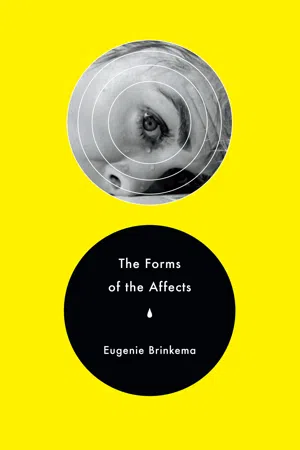The Forms of the Affects
About this book
Offering a bold corrective to the emphasis on embodiment and experience in recent affect theory, Eugenie Brinkema develops a novel mode of criticism that locates the forms of particular affects within the specific details of cinematic and textual construction. Through close readings of works by Roland Barthes, Hollis Frampton, Sigmund Freud, Peter Greenaway, Michael Haneke, Alfred Hitchcock, Søren Kierkegaard, and David Lynch, Brinkema shows that deep attention to form, structure, and aesthetics enables a fundamental rethinking of the study of sensation. In the process, she delves into concepts as diverse as putrescence in French gastronomy, the role of the tear in philosophies of emotion, Nietzschean joy as a wild aesthetic of repetition, and the psychoanalytic theory of embarrassment. Above all, this provocative work is a call to harness the vitality of the affective turn for a renewed exploration of the possibilities of cinematic form.
Frequently asked questions
- Essential is ideal for learners and professionals who enjoy exploring a wide range of subjects. Access the Essential Library with 800,000+ trusted titles and best-sellers across business, personal growth, and the humanities. Includes unlimited reading time and Standard Read Aloud voice.
- Complete: Perfect for advanced learners and researchers needing full, unrestricted access. Unlock 1.4M+ books across hundreds of subjects, including academic and specialized titles. The Complete Plan also includes advanced features like Premium Read Aloud and Research Assistant.
Please note we cannot support devices running on iOS 13 and Android 7 or earlier. Learn more about using the app.
Information

Table of contents
- Contents
- Preface: Ten Points to Begin
- Chapter One. A Tear That Does Not Drop, but Folds
- Chapter Two. Film Theory’s Absent Center
- Chapter Three. The Illumination of Light
- Chapter Four. Grief and the Undialectical Image
- Chapter Five. Aesthetic Exclusions and the Worse than the Worst
- Chapter Six. Disgust and the Cinema of Haut Goût
- Interval. Formalism and Affectivity
- Chapter Seven. Intermittency, Embarrassment, Dismay
- Chapter Eight. Nothing/Will Have Taken Place/But the Place: Open Water Anxiety
- Chapter Nine. To Begin Again: The Ingression of Joyful Forms
- Acknowledgments
- Notes
- Bibliography
- Index
